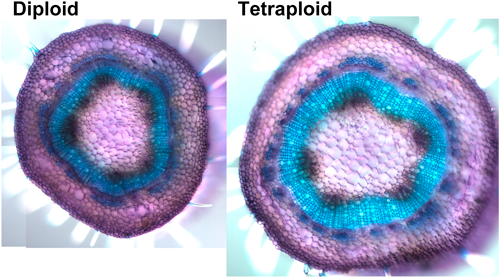3 0 0 0 OA 社会保障・人口問題基本調査『第6回全国家庭動向調査(2018年)』について
- 著者
- 菊池 潤 Jun KIKUCHI
- 出版者
- 国立社会保障・人口問題研究所
- 雑誌
- 社会保障研究 = Journal of Social Security Research (ISSN:03873064)
- 巻号頁・発行日
- vol.6, no.2, pp.203-206, 2021-09
情報
- 著者
- Chikage Umeda-Hara Hidekazu Iwakawa Misato Ohtani Taku Demura Tomoko Matsumoto Jun Kikuchi Koji Murata Masaaki Umeda
- 出版者
- Japanese Society for Plant Biotechnology
- 雑誌
- Plant Biotechnology (ISSN:13424580)
- 巻号頁・発行日
- vol.39, no.3, pp.215-220, 2022-09-25 (Released:2022-09-25)
- 参考文献数
- 28
Somatic polyploidization often increases cell and organ size, thereby contributing to plant biomass production. However, as most woody plants do not undergo polyploidization, explaining the polyploidization effect on organ growth in trees remains difficult. Here we developed a new method to generate tetraploid lines in poplars through colchicine treatment of lateral buds. We found that tetraploidization induced cell enlargement in the stem, suggesting that polyploidization can increase cell size in woody plants that cannot induce polyploidization in normal development. Greenhouse growth analysis revealed that radial growth was enhanced in the basal stem of tetraploids, whereas longitudinal growth was retarded, producing the same amount of stem biomass as diploids. Woody biomass characteristics were also comparable in terms of wood substance density, saccharification efficiency, and cell wall profiling. Our results reveal tetraploidization as an effective strategy for improving woody biomass production when combined with technologies that promote longitudinal stem growth by enhancing metabolite production and/or transport.
- 著者
- Masaomi Yamamura Soichiro Noda Takefumi Hattori Amiu Shino Jun Kikuchi Keiji Takabe Shiro Suzuki Daisuke Shibata Toshiaki Umezawa
- 出版者
- Japanese Society for Plant Cell and Molecular Biology
- 雑誌
- Plant Biotechnology (ISSN:13424580)
- 巻号頁・発行日
- pp.12.0618a, (Released:2012-09-15)
- 参考文献数
- 53
This article has been retracted at the request of the authors and under the agreement between the Editor-in-chief, Taku Demura and the authors.
- 著者
- Chikage Umeda-Hara Hidekazu Iwakawa Misato Ohtani Taku Demura Tomoko Matsumoto Jun Kikuchi Koji Murata Masaaki Umeda
- 出版者
- Japanese Society for Plant Biotechnology
- 雑誌
- Plant Biotechnology (ISSN:13424580)
- 巻号頁・発行日
- pp.22.0716a, (Released:2022-09-17)
- 参考文献数
- 28
Somatic polyploidization often increases cell and organ size, thereby contributing to plant biomass production. However, as most woody plants do not undergo polyploidization, explaining the polyploidization effect on organ growth in trees remains difficult. Here we developed a new method to generate tetraploid lines in poplars through colchicine treatment of lateral buds. We found that tetraploidization induced cell enlargement in the stem, suggesting that polyploidization can increase cell size in woody plants that cannot induce polyploidization in normal development. Greenhouse growth analysis revealed that radial growth was enhanced in the basal stem of tetraploids, whereas longitudinal growth was retarded, producing the same amount of stem biomass as diploids. Woody biomass characteristics were also comparable in terms of wood substance density, saccharification efficiency, and cell wall profiling. Our results reveal tetraploidization as an effective strategy for improving woody biomass production when combined with technologies that promote longitudinal stem growth by enhancing metabolite production and/or transport.

